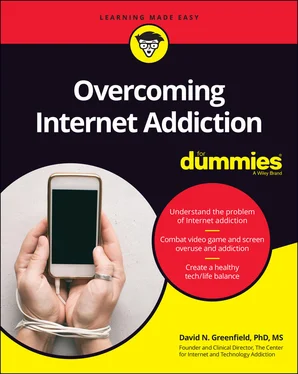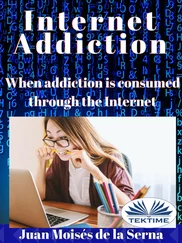 The king of neurotransmitters related to addiction is dopamine. Although other neurotransmitters are undoubtedly involved with addiction, dopamine constitutes the lion’s share of the pleasure drive we see in addiction. Internet screen use elevates dopamine reception at the post-synaptic receptor in the nucleus accumbens, and over time there is an up-regulation of these post-synaptic receptors to manage the increasing level of dopamine present in this area of the brain. See the nearby sidebar “The role of up-regulation and down-regulation in addiction” for details.
The king of neurotransmitters related to addiction is dopamine. Although other neurotransmitters are undoubtedly involved with addiction, dopamine constitutes the lion’s share of the pleasure drive we see in addiction. Internet screen use elevates dopamine reception at the post-synaptic receptor in the nucleus accumbens, and over time there is an up-regulation of these post-synaptic receptors to manage the increasing level of dopamine present in this area of the brain. See the nearby sidebar “The role of up-regulation and down-regulation in addiction” for details.
THE ROLE OF UP-REGULATION AND DOWN-REGULATION IN ADDICTION
As a person increases dopamine in the limbic reward system of their brain, this translates into increased pleasure; not surprisingly, pleasurable behaviors tend to be repeated, especially when there is an unpredictable or variable element to the pleasurable hit. Biologically, this is where up-regulation and down-regulation come in.
As the nucleus accumbens is hit with signals that increase dopamine, the post-synaptic receptor binding sites (call them Pacmen , as in the video game) first begin to up-regulate (become more plentiful) and are constantly occupied by dopamine. The receptor sites then slowly respond less to the same levels of dopamine. This is called down-regulation (or desensitization ), and it makes sense that this would produce tolerance, meaning that you would need more stimulation to get the same effect, which I discuss earlier in this chapter. This is because to keep those neurons firing, they now need more stimulation, and this increase produces down-regulation or desensitization. With technology and screen addiction, this might mean more intense or stimulating content, faster Internet speeds, quicker access, more frequent use, or longer use times — all of which we tend to see with Internet and technology addiction.
All this can lead to the development of reward deficiency syndrome, which occurs when the reward center acclimates to that intense level of stimulation and only receives a significant dopamine hit when engaging in excessive or intensive screen time; by comparison, everything else looks and feels flat and uninteresting. This is a very common complaint from parents and family members where their addict loved one no longer takes pleasure in any previously pleasurable behaviors. This is essentially an example of down-regulation, in that when those hungry Pacmen are consistently fed, they need more stimulation to get the same effect. Real-time living no longer provides the stimulation necessary to fire those neurons in the nucleus accumbens in order to help a person feel good or to experience pleasure from normal living. Those receptors become used to being occupied, and they become accustomed to the resulting increased dopamine levels. Unless the person is continuously excited by repeated Internet or screen use, they experience a biological deficiency in the form of psychological symptoms such as boredom and feeling “blah,” anxious, irritable, unmotivated, or even depressed.
This is a tough place to be because there is a high likelihood of relapse at this time; we generally want to feel good, and the quickest way to feel good is to engage in the behavior that we know will get that result quickly. It’s also a difficult time because the motivation to engage in other real-time behaviors that could eventually prove to be fun and stimulating (dopaminergic) is very low, and it also takes some time for the receptors to re-regulate. This creates a challenging period for the addict and their family, as it occurs between the discontinuation of the old behavior and its resulting neurochemical effects, and engagement in the new behavior, with its more balanced neurochemical state. This new desired state of up-regulation is sort of the opposite of down-regulation on a biological level, and involves getting the dopamine receptors in the nucleus accumbens to re-sensitize to more normal levels of real-life stimulation. The Internet is very stimulating, and things like video games, YouTube, pornography, or even social media can retrain our nervous system to get used to that stimulation.
Recognizing the Mind and Body Aspects of Addiction
 So, what does all this talk of evolution earlier in this chapter have to do with addiction, anyway? Well, the brain’s ability to use dopamine to ensure certain survival behaviors can also be stimulated by other pleasurable behaviors. It seems that drugs, alcohol, sex, food, gambling, the Internet, pornography, video gaming, and even social media all elevate our dopamine levels. Addiction is in part related to becoming habitually dependent on this elevation of dopamine; this, along with various psychological, social, and behavioral factors, produces the experience we classify as addiction. What we get addicted to is the dopamine and, even more so, the anticipation of that dopamine; this, along with other brain chemicals, hormones, and behaviors, essentially hijacks the reward circuits in the brain that are meant to increase our survivability. This means that to the brain, addiction is a misguided piggybacking of survival drives.
So, what does all this talk of evolution earlier in this chapter have to do with addiction, anyway? Well, the brain’s ability to use dopamine to ensure certain survival behaviors can also be stimulated by other pleasurable behaviors. It seems that drugs, alcohol, sex, food, gambling, the Internet, pornography, video gaming, and even social media all elevate our dopamine levels. Addiction is in part related to becoming habitually dependent on this elevation of dopamine; this, along with various psychological, social, and behavioral factors, produces the experience we classify as addiction. What we get addicted to is the dopamine and, even more so, the anticipation of that dopamine; this, along with other brain chemicals, hormones, and behaviors, essentially hijacks the reward circuits in the brain that are meant to increase our survivability. This means that to the brain, addiction is a misguided piggybacking of survival drives.
This piggybacking of the reward neuropathways leads to a common misunderstanding about the biology of addiction because we often wrongfully assume that we get addicted to a substance. However, that does not account for behavioral (process) addictions, within which Internet and video game addictions would fall. This is also true for some of the other behavioral addictions, including sex, food, and gambling. The brain, when excited by a video game, doesn’t look much different from the brain ingesting cocaine, eating a great meal, or having sex (although there may be differences in the overall level of dopamine innervation). These differences are relevant, of course, and dopamine is involved in all these behaviors and is linked to our survival, as I explain earlier in this chapter.
The following sections go into more detail on how the brain is susceptible to addiction.
Being wired to maximize pleasure and minimize pain
 The problem here is that in a sense, our brains act as if our addictive behavior is enhancing our health and well-being. However, this couldn’t be further from the truth. Perhaps this is partly why most addicts take a long time to reach a point where they see how the harm overrides the pleasure they are receiving. Some might call this process denial, where our brain is on autopilot, engaging in a dopaminergic behavior that tricks it into acting on a pattern that maybe hurting us. This is the essence of the addiction paradox: The brain is doing what it knows best, but at the same time, it is creating a significant life problem. This is in part why recovering from an addiction is so hard — why would you want to stop something that feels so pleasurable?
The problem here is that in a sense, our brains act as if our addictive behavior is enhancing our health and well-being. However, this couldn’t be further from the truth. Perhaps this is partly why most addicts take a long time to reach a point where they see how the harm overrides the pleasure they are receiving. Some might call this process denial, where our brain is on autopilot, engaging in a dopaminergic behavior that tricks it into acting on a pattern that maybe hurting us. This is the essence of the addiction paradox: The brain is doing what it knows best, but at the same time, it is creating a significant life problem. This is in part why recovering from an addiction is so hard — why would you want to stop something that feels so pleasurable?
The other factor here is that as you increase activity in the nucleus accumbens, you are simultaneously inhibiting activity in the prefrontal cortex, where reasoning and executive functions are located; the brain is all about pleasure and has less ability (or desire) to apply the brakes once it’s in the pleasure cycle.
Читать дальше

 The king of neurotransmitters related to addiction is dopamine. Although other neurotransmitters are undoubtedly involved with addiction, dopamine constitutes the lion’s share of the pleasure drive we see in addiction. Internet screen use elevates dopamine reception at the post-synaptic receptor in the nucleus accumbens, and over time there is an up-regulation of these post-synaptic receptors to manage the increasing level of dopamine present in this area of the brain. See the nearby sidebar “The role of up-regulation and down-regulation in addiction” for details.
The king of neurotransmitters related to addiction is dopamine. Although other neurotransmitters are undoubtedly involved with addiction, dopamine constitutes the lion’s share of the pleasure drive we see in addiction. Internet screen use elevates dopamine reception at the post-synaptic receptor in the nucleus accumbens, and over time there is an up-regulation of these post-synaptic receptors to manage the increasing level of dopamine present in this area of the brain. See the nearby sidebar “The role of up-regulation and down-regulation in addiction” for details. The problem here is that in a sense, our brains act as if our addictive behavior is enhancing our health and well-being. However, this couldn’t be further from the truth. Perhaps this is partly why most addicts take a long time to reach a point where they see how the harm overrides the pleasure they are receiving. Some might call this process denial, where our brain is on autopilot, engaging in a dopaminergic behavior that tricks it into acting on a pattern that maybe hurting us. This is the essence of the addiction paradox: The brain is doing what it knows best, but at the same time, it is creating a significant life problem. This is in part why recovering from an addiction is so hard — why would you want to stop something that feels so pleasurable?
The problem here is that in a sense, our brains act as if our addictive behavior is enhancing our health and well-being. However, this couldn’t be further from the truth. Perhaps this is partly why most addicts take a long time to reach a point where they see how the harm overrides the pleasure they are receiving. Some might call this process denial, where our brain is on autopilot, engaging in a dopaminergic behavior that tricks it into acting on a pattern that maybe hurting us. This is the essence of the addiction paradox: The brain is doing what it knows best, but at the same time, it is creating a significant life problem. This is in part why recovering from an addiction is so hard — why would you want to stop something that feels so pleasurable?










